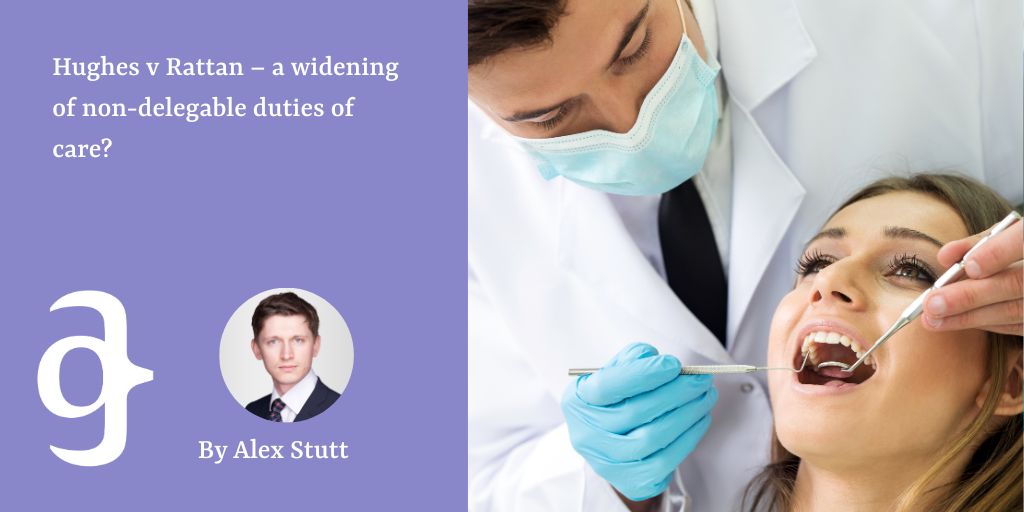Hughes v Rattan – a widening of non-delegable duties of care?

In any compensation claim for life-changing injuries, it is critical to identify a defendant with sufficient means to provide reasonable compensation. It is for this reason that the case of Hughes v Rattan [2022] EWCA Civ 107 is so significant. This case potentially widens the applicability of the test for non-delegable duties of care. As a result, it may now be easier for those who have suffered life-changing injuries to direct their claims against defendants with ample financial resources (such as companies and their owners), instead of having to pursue individuals who may lack the necessary financial means to provide reasonable and fair compensation.
The facts of Hughes v Rattan
The Claimant alleged that she received negligent dental treatment on various occasions between August 2009 and December 2015. The Defendant, Dr Rattan, was the owner and operator of the practice the Claimant attended for all of her dentistry.
The Claimant was not treated by the Defendant himself. The Claimant’s allegations of negligence were against three associate dentists (“the associates”) and one trainee dentist who all treated her at the Defendant’s practice. The associates were self-employed dentists who were sub-contracted to work for the Defendant. The trainee dentist was an employee of the Defendant.
The Defendant provided NHS dental care pursuant to a General Dental Services contract with the local Primary Care Trust. All of the Claimant’s dentistry was paid for by the NHS under the same.
Non-delegable duty of care
The Claimant alleged that the Defendant owed her a non-delegable duty of care. On that basis, she argued that he should be personally liable for any negligence in the dental work performed by the associates and the trainee dentist.
The Claimant succeeded in this argument, both at the High Court and then at the Court of Appeal.
Both court judgements confirmed that the leading authority on this issue is the Supreme Court decision Woodland v Swimming Teachers Association and others [2014] AC 537. Following that case, the criteria for a non-delegable duty of care are as follows:
- The claimant is a patient or a child, or for some other reason is especially vulnerable or dependent on the protection of the defendant against the risk of injury;
- There is an antecedent relationship between the claimant and the defendant, independent of the negligent act or omission itself;
- The claimant has no control over how the defendant chooses to perform those obligations;
- The defendant has delegated to a third party some function which is an integral part of the positive duty which he has assumed towards the claimant; and
- The third party has been negligent not in some collateral respect but in the performance of the very function assumed by the defendant and delegated by the defendant to him.
Lord Justice Bean gave the leading judgement in the Court of Appeal. He found that the Claimant had been a patient of the Defendant at his practice and that was sufficient to satisfy criteria 1 – she did not also have to be “especially vulnerable”. Furthermore, Lord Bean found that there was the necessary antecedent relationship between the Claimant and the Defendant (criteria 2) and that this had been formed on each occasion when the Claimant signed the dental treatment plan for the Defendant to provide her with NHS-funded treatment. The appeal court was also satisfied that the Claimant did not have control over how the Defendant performed their obligations, even though the Claimant could express a preference for a particular dentist (criteria 3).
There was no real argument that the fourth and fifth criteria were also easily fulfilled on the facts.
Life changing injuries
Unfortunately, life-changing injuries can occur in almost all walks of life. However, prior to this judgement, non-delegable duties of care had been found in only a fairly limited number of settings, all of which could well be described as residential and/or tightly controlled in nature (namely schools, hospitals, workplaces and detention centres).
The circumstances in this case were very different in that the Defendant was an individual (albeit one who owned his own company) and the Claimant’s dentistry was provided in a small independent clinic, from which the Claimant was free to come and go whenever she chose. Nevertheless, it was found that the Defendant did owe the Claimant a non-delegable duty of care.
This begs the question – are the courts now likely to find that the owners of private clinics invariably owe their patients a non-delegable duty of care?
As the law currently stands, we cannot be so definitive. Future cases will of course turn on their own unique facts. In Hughes v Rattan, the fact that the Defendant had a contract with the Primary Care Trust and was providing NHS funded dentistry was significant and helped to show the necessary antecedent relationship was present. Had the dentistry been provided on a completely private basis, it is not clear whether the court would have reached the same finding. It may be that such a case makes its way to the courts in future and helps to clarify the law further in this area.
In any event, Hughes v Rattan is a significant case and one those running catastrophic injury claims should be alive to. As noted, where a non-delegable duty of care is found, it may enable a well-financed company or company owner to be added or substituted into a claim as a defendant. This has the potential to improve greatly the chances that those who have suffered life changing injuries will have access to the compensation that they need.
Knowing whether you may have a viable claim, and which defendant to pursue it against, are often highly complex issues. As experienced legal practitioners, we can assist you to maximise your chances of obtaining reasonable and fair compensation for life changing injuries. If you are considering bringing an injury compensation claim, please do not hesitate to get in touch with our experienced legal team for further guidance.
* Disclaimer: The information on the Anthony Gold website is for general information only and reflects the position at the date of publication. It does not constitute legal advice and should not be treated as such. It is provided without any representations or warranties, express or implied.*
No comments